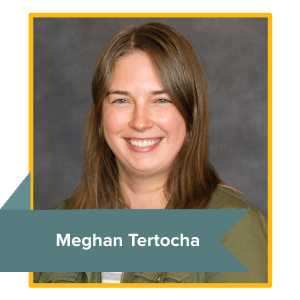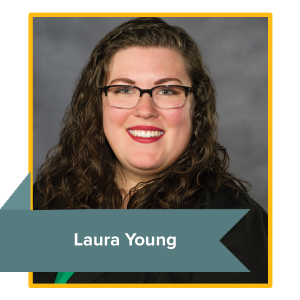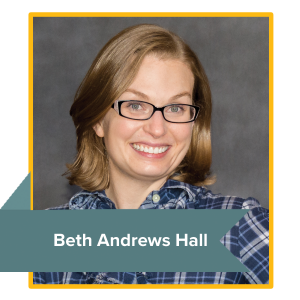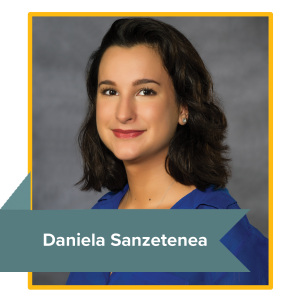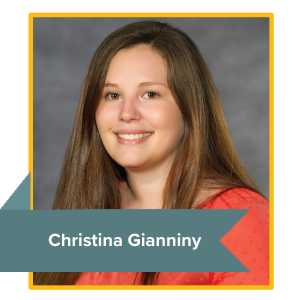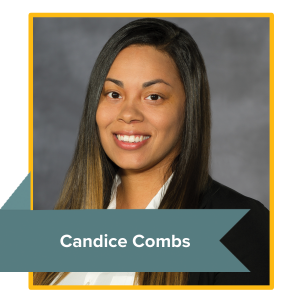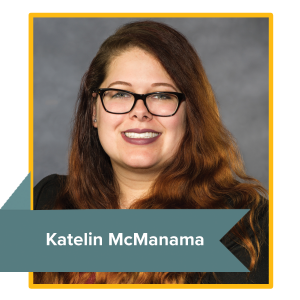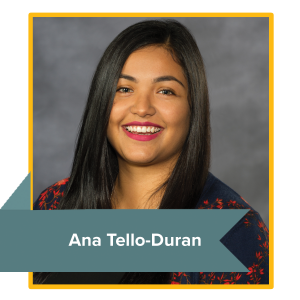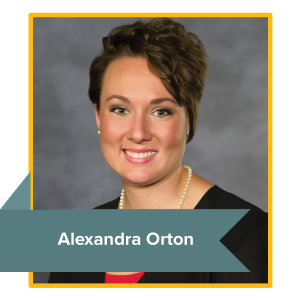Child Welfare Stipend Program at VCU
By Alan Rodriguez Espinoza
VCU School of Social Work
After a 7-year-long hiatus, the Child Welfare Education and Support Program is back at Virginia Commonwealth University under a new name: the Child Welfare Stipend Program.
The program has returned to Virginia and is being managed by the Virginia Department of Social Services. It was first reintroduced at Radford University during the fall of 2016, and as of fall 2017 is being offered at VCU as well as George Mason University and Norfolk State University.
VCU program coordinator Naomi Reddish says the CWSP gives social work students at participating universities the opportunity to specialize in child welfare. Additionally, the program provides them “financial assistance through the stipend as well as enhances student resumes and employability upon graduation.”
The CWSP grants participating students with a $10,000 stipend for every academic year they are enrolled in the program. In return, stipend recipients commit to “give back by seeking and obtaining employment in child welfare at a local Department of Social Services in the Commonwealth of Virginia upon graduation.”
“Just as field work is the signature pedagogy of social work education,” Reddish said. “It is vital for students to gain hands-on experience in the field while under the supervision of seasoned child welfare social workers.”
She says it is important that students “apply social work values” to their work in child welfare and “learn to actively engage families” within the guidelines set by the Commonwealth of Virginia “with integrity and through a trauma-informed lens.”
Reddish says alumni of the program “have seen the benefit of the program and hoped that it would return to Virginia.”
“This program has made a difference in the past by preparing students to be professional and effective child welfare social workers,” she said. “In addition, agencies gain the value of having master’s level social work students implementing social work values and innovation in local agencies during their fieldwork.”
University of Virginia graduate Meghan Tertocha first heard about the CWSP from coworkers who had previously participated in the program. Tertocha returned to school in the fall, this time at Virginia Commonwealth University. She says the program will help her “advance her career” in the field of child welfare.
Tertocha says child welfare is a focus area she is very passionate about because it allows her to engage with families in order to “reach decisions that are in the best interest of their children.”
“Public service means working for and with the community to make it a stronger and more engaged place for us all,” she says. “And that’s the essence of what child welfare workers get to do every day.”
Tertocha is looking forward to “growing [her] skill set” and “learning from other skill sets” in the program. While the CWSP will bring about a rigorous schedule, she is thankful for her employer’s support and says “part of being a successful social worker is learning how to create a good work and life balance.”
For Laura Young, applying for the CWSP was an “easy decision.” She says it is “a unique opportunity to receive intensive training and make long-term connections,” and she jokingly adds that “the financial aid doesn’t hurt either!”
“I came to child welfare simply because I love children,” Young says. “And I firmly believe that every child is worthy of love and belonging in a family who is equipped to meet their needs.”
She believes that family is “the first place that children learn how to belong to a common good beyond themselves,” and thus, “we all thrive when families have the support they need to function optimally.”
Young points to direct engagement through child welfare work as the best way to “provide this support to the most vulnerable children and families in our community.” She herself is thankful for the support expressed from the program and her friends and loved ones.
“I am most looking forward to the relationships I will form in this program… to growing with my fellow students and to connecting with other professionals who will become colleagues,” Young says.
While looking for options to fund her studies, Beth Andrews Hall found the CWSP to be the perfect fit for her needs.
“When I made the decision to return to school, I knew that I wanted to work with children and families,” she says. “The CWSP will offer me the opportunity to have additional learning experiences outside of the regular classroom and field placement work.”
Hall says she has had experience in the social work field before. However, this time around she feels “called to work with children and families now that [she is] a mother.”
Hall is excited to “start working within the field right away,” and she is hopeful that she will be “able to keep a healthy balance of work, school, and family life.”
Daniela Sanzetenea says she had been “searching profusely for scholarship opportunities” when she came across the CWSP. The program will be of great assistance with her finances, and she is “excited to learn tools on how to better serve” children and families.
“What drove me to pursue a master in social work is my passion for mental health and victim advocacy,” Sanzetenea says. “My passions go hand in hand in child welfare as I am given the ability to educate, support, and assist children and families overcome their greatest challenges.”
Sanzetenea believes that “children are the most vulnerable population and require the most guidance and support.” She is looking forward to applying her fluency in Spanish to her work in order to “ engage with culturally diverse youth and adult populations.”
She says she is “thankful for this opportunity and cannot wait to get started.”
Christina Gianniny “always knew [she] wanted to work with children,” and she is “looking forward to studying under people who share the same passion for child welfare that [she does].” She believes that the CWSP will “open many doors” for her within the social work field.
“The CWSP will really assist me financially,” Gianniny says. “But that wasn’t the drive force behind pursuing this program. Academically, I can now narrow my focus to my area of interest of study, which will allow me to better suit my client’s needs in the future.”
Gianniny says that the program’s requirement to balance the responsibilities of a student and a social worker will be “difficult, but manageable,” and she does not expect to encounter any issues with this program “that cannot be resolved.”
“I was raised by a single mother of three children who worked endlessly to ensure we could live our best lives,” Candice Combs says. “Financially, school was not an option. However, I decided to take the chance.”
Taking that chance will be paying off for Combs, who says the CWSP responds to her needs “financially and academically.” The program will help her fund her education, and it will help her “in order to sharpen certain skills to make a difference in this world.”
Combs chose child welfare as a career because it assists her in “defining the current needs for individuals in order for them to function effectively in society.” To be a social worker is her way to ensure that “no one falls through the cracks.”
Combs is excited to touch the lives of the clients with whom she is working and she anticipates to draw “different connections from the classroom into the field.” She is looking forward to learning more about child welfare and to “creating relationships with future colleagues”
“I am looking forward to a successful program,” Combs says. “ I am relieved to know that we will finish the program with all the necessary tools to search and gain employment afterwards.”
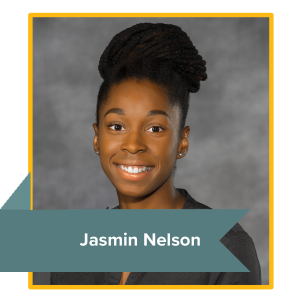 For Jasmin Nelson, her “desire as a social worker is to keep families together and to advance the quality of life for children and families.” She says she was “super excited about applying for the program” because it really resonated with her passion for the child welfare field.
For Jasmin Nelson, her “desire as a social worker is to keep families together and to advance the quality of life for children and families.” She says she was “super excited about applying for the program” because it really resonated with her passion for the child welfare field.
Through her work in child welfare, Nelson hopes to assist families to “build healthier relationships” and to “better cope with a range of experiences, systemic problems and stresses of everyday life.”
Nelson says the program will provide her with “a plethora of hands-on experiences and advanced level skills that will be used in support of addressing social issues.” She is looking forward to “working independently” and forming “professional relationships” with her clients.
While working within the field of child welfare can be “very rewarding,” she anticipates “situations of stress and emotion” and thus she says that it is crucial “to keep a positive mindset and maintain methods of self-care.”
For Katelin McManama, child welfare was never in her plans, and neither was coming back to school. McManama graduated with a bachelor’s degree in psychology in May of 2014, and she began working at a state run psychiatric hospital for children and adolescents after graduating.
“The experience really opened my eyes to the immense need for skilled and caring child welfare workers,” she says. “Many of the children in the hospital could have avoided being admitted if more support were available in their own communities.”
While returning to school did not sound financially viable, McManama says the CWSP “would help [her] offset the cost immensely.” She says she is looking forward to the classes she will be taking, which will help her focus “on not only children, but their surrounding support systems as well.”
“Children don’t exist in a vacuum,” McManama says. “And working with family members, school staff and other care providers is key to ensuring a stable environment.”
Like with many other students who will be participating in the CWSP, Ana Tello-Duran says “graduate school was out of [her] reach financially.” This, however, did not stop her from pursuing a master’s degree.
“I am the first person in my family to get a higher education,” Tell-Duran says. “I knew that I could not stop after finishing my BSW. I was determined to pursue a MSW at VCU.”
Tello-Duran says she has a “personal connection” to the field of child welfare, for she has “personally witnessed and experienced the lack of support provided to this population.” She is determined to make “a positive difference serving children and families” through her involvement in social work.
Tello-Duran calls the CWSP a “once in a lifetime opportunity” and she believed that the courses within the program will help her “guide and strengthen [her] social work practice.”
Alexandra Orton is passionate about helping families that have been affected by substance abuse. She says she has “first hand experience” with the negative impacts of this issue and she is determined to helping respond to this type of trauma
Orton says she chose the Child Welfare Stipend Program because it promotes an issue she is very passionate about, the improvement of child welfare services. She says this is an area of social work that she has not had much exposure to in her previous education.
“[The CWSP] is allowing me to address a weak point in my social work education,” Orton says. “So that I may be a more well-rounded social worker upon graduation.”
Orton says she wants to work for an agency that will help her grow as a social worker and will value client-center care. She says she is eager to “get out there and put this knowledge into action.”
Categories Community, Education, Students